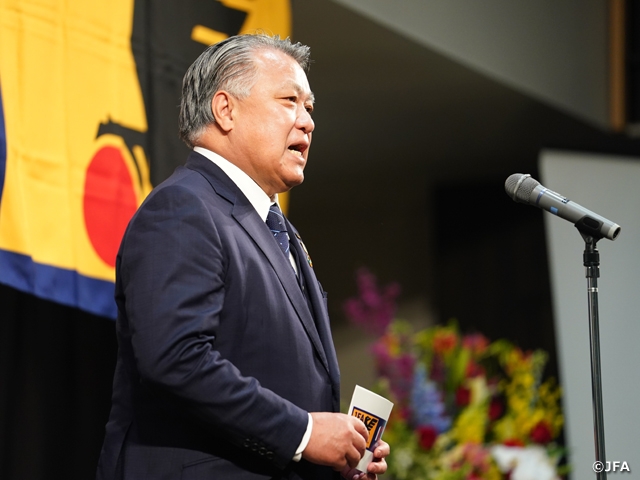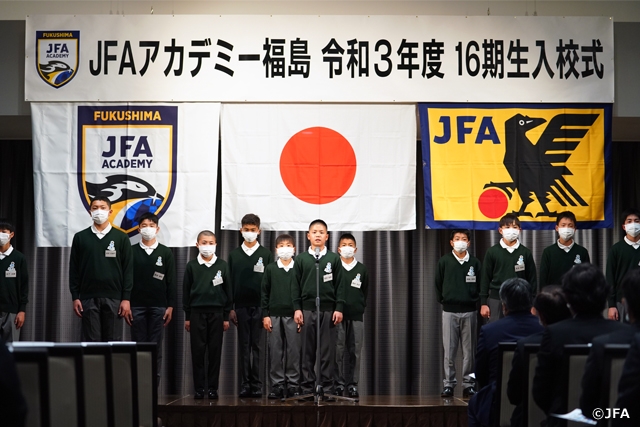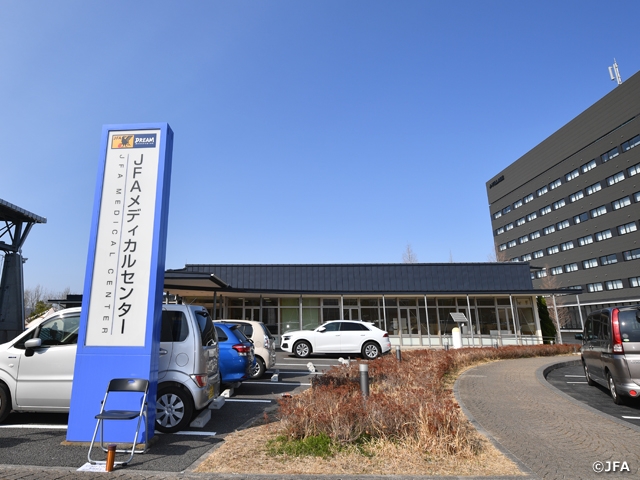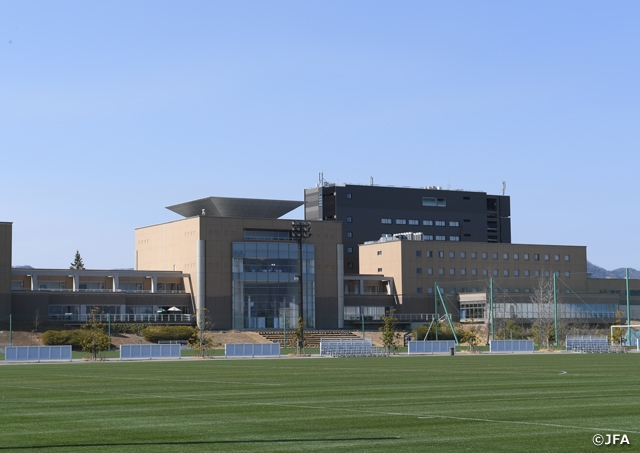NEWS
“Not letting the memories of the Great East Japan Earthquake fade away” 10 years since the Great East Japan Earthquake – Relay Column Vol.17
15 April 2021

It has been 10 years since the Great East Japan Earthquake. While the restoration has progressed with a ton of support from home and abroad, there is still a long way to go for a full recovery. Here we will deliver essays and columns of people involved in football, reflecting on their own experience and perspective on the Great East Japan Earthquake.
The final column will be presented by JFA President TASHIMA Kohzo.
It is said that 10 years can bring a lot of changes, but after reading all the columns written so far, I came to realise that everyone has faced the Great East Japan Earthquake and the 10 years that followed in their own way, in accordance with their respective positions. And it also reminded me that we are still in the middle of the “reconstruction” process. Working together with the football family, JFA will continue to give the utmost efforts to help the reconstruction process.
The restart of JFA Academy Fukushima has given us a sense of closure to a certain phase. J-Village was renovated and reopened in the spring of 2019. The JFA Medical Centre located next to J-Village has resumed its operation in March of this year. And JFA Academy Fukushima welcomed new players in April. By having all three institutions back in operation, we can finally say that we have made a step forward towards true recovery. JFA Academy Fukushima opened in April 2006 at J-Village in Hirono Town (Futaba District, Fukushima). The Academy introduced a unique lodging system developed by JFA, where players have trainings and human education while attending at a local integrated junior and senior high school. Although the academy started its operation with the cooperation of Fukushima Prefecture and towns of Futaba District; Tomioka Town, Hirono Town, and Naraha Town, they were forced to relocate after the Great East Japan Earthquake of 11 March 2011. From April 2011, the boys relocated to Tokinosumika in Gotemba City, Shizuoka, while the girls relocated to Teijin’s recreation facility at Susono City, Shizuoka. And 10 years later, starting from April 2021, the boy’s academy team was able to return to J-Village ahead of the girl’s team. It has been determined that the girl’s team will also make their return from Shizuoka in 2024, which makes us brace ourselves ahead of a new start.
Currently, there are JFA Academies in Kumamoto Uki, Sakai (Osaka), and Imabari (Ehime), but it all started from Fukushima. In that sense, this return feels like we are returning to our hometown. However, before we celebrate our return, we must convey our utmost gratitude to Tokinosumika, who has accepted the players of the Academy for the past 10 years, and to everyone involved in Fukushima and Shizuoka Prefectures, who gave tireless efforts to make this relocation possible. As Mr. SHOJI Masafumi, CEO of Tokinosumika, mentioned in his column(Vol.10), the fact that the academy players, who were affected by the disaster on 11 March, were able to attend the entrance ceremony with school and accommodation facilities secured on 6 April, was a miraculous accomplishment. The Great East Japan Earthquake struck during spring break, which is between graduation and admission, and all arangements for the new school year had already been completed at the time. The search for a new school for the academy players took place at the worst timing possible. We were responsible to take care of the players, so we could not say “The academy will be closed. Good luck finding a new school.” However, the search does not come easy when you are looking for lodging and training facilities for over 100 players. I almost broke into tears when we received warm invitation letters from Ishikawa and Kagoshima, saying they were willing to host our players. That is why we were so relieved when it was decided that Tokinosumika was going to host the players and their school situations were all settled. Given the kindness of the people involved in Shizuoka Prefecture and Gotemba City who did so much for us, it is heart-breaking to have to leave Tokinosumika. However, the academy’s relocation to Shizuoka was originally based on the premise of eventually returning to Fukushima, and thus we decided that the academy’s return was an essential piece for the reconstruction of Fukushima and the revitalisation of J-Village.
After returning to Fukushima, the academy welcomed 19 first grade players on 6 April, making them the 16th class to enter the academy. It was also determined that the boys will only be trained through the junior high school category, for age 13 to 15, from this year on (we will continue to provide six years of training and education for the girl’s team who will be returning to Fukushima in 2024). There has always been a difference in the football training environment between boys and girls, and after series of discussions by the JFA Technical Committee, we came to the conclusion to shorten the years for the boy’s team. For the boys who will be graduating from the academy at the age of 15, we will make sure to find them a new team, whether it’s a youth team of a J.League Club, local club team, or a high school team. Even if the number of years at the academy changes, our policy of focusing on human education through the lodging system will remain unchanged. The goal of the academy is not just to train professional football players. The academy strives to nurture a human being who can effectively utilise their communication skills, act with dignity regardless of where they are in the world, always be positive, and be able to assert their opinion, while having a personality that does not tolerate any discrimination based on race, ethnicity, religion, gender, or skin colour. This has always been the academy’s philosophy since day one, but I feel that it is becoming more important in this day and age of the Covid-19 pandemic.

The JFA Academy was modelled after the INF Clairefontaine, the French national football centre, which led France to winning the world title. Mr. Claude DUSSEAU, who was the principal at Clairefontaine, greatly contributed to vitalising the academy when he was invited to JFA Academy. Mr. DUSSEAU stressed the importance of holding league competitions, and his principle is now implemented to youth leagues such as the Prince Takamado Trophy JFA U-18 Football Premier League and the Prince Takamado Trophy JFA U-18 Football Prince League. His coaching style embraced both the immutable and transient aspects of football, but he especially emphasised the importance of the immutable aspects. Although his philosophy has been adapted in Japan to some extent, we will continue to build on his legacy to keep the momentum going. With the academy returning to Fukushima, the origin of the JFA Academy, we would like to return to our roots and disseminate the academy’s philosophy to the world.
On 20 March, the JFA Medical Centre, which is located next to J-Village, also resumed operation for the first time in 10 years, thanks to the support of Fukushima Medical University. Because we find it insufficient that the National Training Centre has no medical department, in August 2009, the facility was newly established to serve as the medical science institution of J-Village. The centre’s medical attention was not limited to athletes, as orthopaedic and rehabilitation clinics, and latest medical systems such as MRI were provided to the local residents. That has not been changed after we reopened the facility. The resumption of the medical centre was not possible unless the people who evacuated from the region returned to their hometowns, as it is managed under the direct control of JFA, and it can be operated when it is payable. When the medical centre opened in 2009, we aimed to have surplus after the first three years. However, in 2011, the entire region was struck by the Great East Japan Earthquake just when we were about to achieve our goal. We will continue to contribute to the local medical care, while striving to achieve surplus as soon as possible. Also, through close collaboration with “Prince Takamado Memorial JFA YUME Field” established in Makuhari, Chiba, we will carry out research that will be useful for the development of the health and injury prevention for the youth category, female athletes, and senior generation.

I will never forget the excitement I felt when I first visited J-Village, which opened in 1997. Once stepping outside the hotel, lush green turf pitches await the players, and the facility allows them to take a quick shower after training and have a meal afterwards. The beautiful environment surrounded by nature keeps them focused on their trainings. For someone who spent time in Germany and saw the massive difference in training environment between the two countries, I was elated to see the new facility, which made me shout, “We finally have a facility like this in Japan.” Until J-Village was founded, there were not many ties between the Japanese football community and Fukushima. However, after the facility reminiscent of the German “Sportschule” was established, it functioned as the National Training Centre for Japanese football, served a central role in developing coaches and referees, and produced many talents over the years. Some coaches, such as Coach Philippe TROUSSIER and Coach ZICO, often used the facility for training camps of the Japan National Team. When looking back, since J-Village opened in 1997, Japanese football has grown at an unprecedented rate until 2011. During that period, Japan made its first appearance at the FIFA World Cup in 1998, and reached the round of 16 in both 2002 and 2010. The facility has contributed greatly to those achievements, making it a special place for Japanese football.
After the J-Village was founded, facilities such as J-STEP, J-GREEN Sakai, and Prince Takamado Memorial JFA YUME Field were established in Shizuoka, Osaka, and Chiba respectively. While the newest addition, the JFA YUME Field, serves as a base of activities for elite teams including the national teams, J-Village, J-STEP, and J-GREEN Sakai are used by a wider range of football players and fans. In terms of quality and quantity, there is no facility in Japan that surpasses the J-Village, and it will continue to be used in various ways in the future. Tomioka is a neighbouring town to J-Village, where Tomioka Daiichi Junior High School and Tomioka High School are located. Through its integrated junior and senior high school programme, they are considered as a national powerhouse in the badminton community, and known as the school attended by world champion MOMOTA Kento. These schools were also affected by the Great East Japan Earthquake, but in April 2015, “Futaba Mirai Gakuen” opened in Hirono Town by taking over Tomioka High School, and in April 2019, a junior high school was added to get the school back on track to retain their position as a national powerhouse. Eventually, we will most likely witness another world champion come out from this school. Together with various other sports, we hope to disseminate positive news from J-Village and Fukushima, which we consider as our home away from home. In that way, we believe that we can be of help for the reconstruction of the affected areas without letting the memories of the Great East Japan Earthquake fade away.

Related News
-
2021/04/12
“The act of paying it forward” 10 years since the Great East Japan Earthquake – Relay Column Vol.16

-
2021/04/09
“Something we can do as a Japanese company” 10 years since the Great East Japan Earthquake – Relay Column Vol.15

-
2021/04/02
“The spirit of solidarity” 10 years since the Great East Japan Earthquake – Relay Column Vol.14

-
2021/04/01
“A country that is moving forward while cherishing the past” 10 years since the Great East Japan Earthquake – Relay Column Vol.13

-
2021/03/31
“A child’s smile is a pass to the future” 10 years since the Great East Japan Earthquake – Relay Column Vol.12

Latest News
-
National Teams
2024/04/23
【Match Report】U-23 Japan National Team lose to Korea Republic to advance to knockout stage as runners-up - AFC U23 Asian Cup Qatar 2024™

-
National Teams
2024/04/20
【Match Report】U-23 Japan National Team advance past group stage with two consecutive clean sheets - AFC U23 Asian Cup Qatar 2024™

-
National Teams
2024/04/17
【Match Report】U-23 Japan National Team win first group-stage match despite playing with 10 men following first-half sent-off - AFC U23 Asian Cup Qatar 2024™

-
National Teams
2024/04/12
U-17 Japan Women's National Team squad & schedule - AFC U17 Women's Asian Cup™ Indonesia 2024 (4/27~@Chiba, 4/29~@Thailand, 5/3~@Indonesia)

-
Referees
2024/04/05
YAMASHITA Yoshimi, TESHIROGI Naomi, and BOZONO Makoto named to officiate matches in the Games of the XXXIII Olympiad (Paris 2024)



